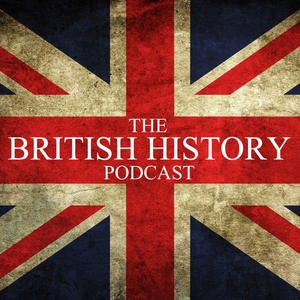
“The old sorrow is not so keen now.” (Elinore Rupert, Part 10)
06/25/21 • 17 min
It is true, I want a great many things I haven’t got, but I don’t want them enough to be discontented and not enjoy the many blessings that are mine. I have my home among the blue mountains, my healthy, well-formed children, my clean, honest husband, my kind, gentle milk cows, my garden which I make myself. I have loads and loads of flowers which I tend myself. There are lots of chickens, turkeys, and pigs which are my own special care. I have some slow old gentle horses and an old wagon. I can load up the kiddies and go where I please any time. I have the best, kindest neighbors and I have my dear absent friends. Do you wonder I am so happy?
Elinore shares some of the personal joys and sorrows that she has experienced since moving to Wyoming. I appreciate Elinore’s attitude about it all. Even in the midst of heartbreak, there are always things for which we can be grateful.
Rupert’s letters are in the Public Domain.
It is true, I want a great many things I haven’t got, but I don’t want them enough to be discontented and not enjoy the many blessings that are mine. I have my home among the blue mountains, my healthy, well-formed children, my clean, honest husband, my kind, gentle milk cows, my garden which I make myself. I have loads and loads of flowers which I tend myself. There are lots of chickens, turkeys, and pigs which are my own special care. I have some slow old gentle horses and an old wagon. I can load up the kiddies and go where I please any time. I have the best, kindest neighbors and I have my dear absent friends. Do you wonder I am so happy?
Elinore shares some of the personal joys and sorrows that she has experienced since moving to Wyoming. I appreciate Elinore’s attitude about it all. Even in the midst of heartbreak, there are always things for which we can be grateful.
Rupert’s letters are in the Public Domain.
Previous Episode

“They told us the Indian ways were bad.” (US Indian Policy: Violence, Displacement, and Assimilation)
Pupils at Carlisle Indian Industrial School, Pennsylvania, c. 1900 (public domain)
There were eight in our party of bronzed children who were going East with the missionaries. Among us were three young braves, two tall girls, and we three little ones, Judéwin, Thowin, and I. We had been very impatient to start on our journey to the Red Apple Country, which, we were told, lay a little beyond the great circular horizon of the Western prairie. Under a sky of rosy apples we dreamt of roaming as freely and happily as we had chased the cloud shadows on the Dakota plains. We had anticipated much pleasure from a ride on the iron horse, but the throngs of staring palefaces disturbed and troubled us ... children who were no larger than I hung themselves upon the backs of their seats, with their bold white faces toward me. Sometimes they took their forefingers out of their mouths and pointed at my moccasined feet. Their mothers, instead of reproving such rude curiosity, looked closely at me, and attracted their children’s further notice to my blanket. This embarrassed me, and kept me constantly on the verge of tears.
“The School Days of an Indian Girl” by Zitkála-ŠáFor decades, before they were forced onto reservations, Native Americans had friendly and even intimate contact with non-natives. But as settlements increased, so did the violence, and death. Eventually, the US government calculated that it was cheaper to kill the Indian way of life than to kill Indians.
Music:
Further reading and listening:
Carlisle Indian School Research Podcast
“Indigenous People in Wyoming and the West” (wyohistory.org)
Letter by Captain Silas Soule to Major Edward W. Wynkoop describing Sand Creek atrocities (Scroll down the page for the letter.)
Life of George Bent: written from His Letters
Personal Stories from the US Dakota War of 1862
Stuff You Missed in History Class Podcast (Jim Thorpe)
Zitkála-Šá: Trailblazing American Indian Composer | Unladylike2020 | American Masters | PBS
Next Episode

“…She gave him a dose of morphine and whiskey.” (Elinore Rupert, Part 11)
Sally Hemings’s Quarters (image credit: monticello.org)
Someone On The Internet said, “Studying history will sometimes make you feel extremely angry. If studying history always makes you feel proud and happy, you probably aren’t studying history.”
I must be doing it right!
I had forgotten that Elinore was born and raised in the antebellum South, but she reminded me with her Christmas letter and racist party “game.” As I was trying to figure out a way out of recording it, I remembered why the American Revolution became more interesting to me. It was because I learned more about the Founding Fathers in their full humanity, and not as demigods in bronze and marble. You’ll be glad to know that there are no demigods in this episode. Only fallible human beings.
Additional Reading on the Founders, slavery, and the African Americans mentioned in the episode:
The Founding Fathers on Slavery (battlefields.org)
James Madison and Slavery (including Billey) (princeton.edu)
Thomas Jefferson and Slavery (monticello.org)
Thomas Jefferson and Sally Hemings (monticello.org)
James Hemings (chef) (monticello.org)
Benjamin Banneker (whitehousehistory.gov)
Letter from Benjamin Banneker to Thomas Jefferson (archives.gov)
Letter from Thomas Jefferson to Benjamin Banneker (archives.gov)
Phillis Wheatley (poetryfoundation.org)
If you like this episode you’ll love
Episode Comments
Generate a badge
Get a badge for your website that links back to this episode
<a href="https://goodpods.com/podcasts/american-epistles-189901/the-old-sorrow-is-not-so-keen-now-elinore-rupert-part-10-17538501"> <img src="https://storage.googleapis.com/goodpods-images-bucket/badges/generic-badge-1.svg" alt="listen to “the old sorrow is not so keen now.” (elinore rupert, part 10) on goodpods" style="width: 225px" /> </a>
Copy




